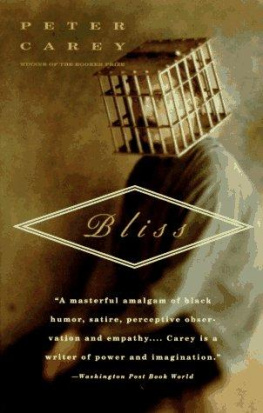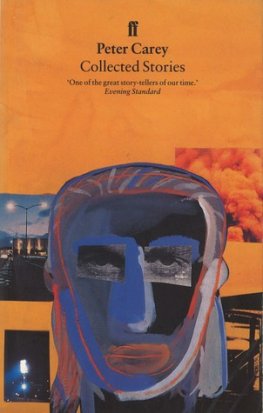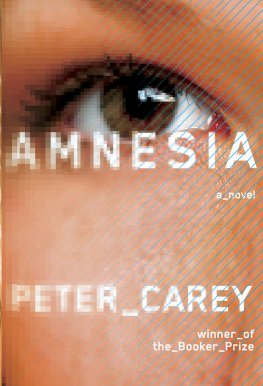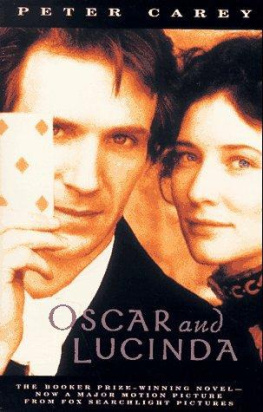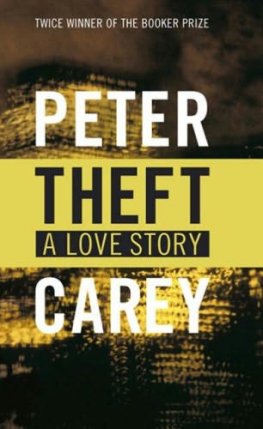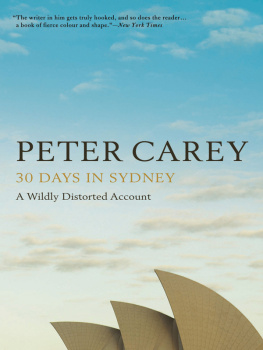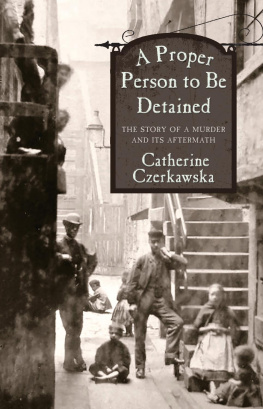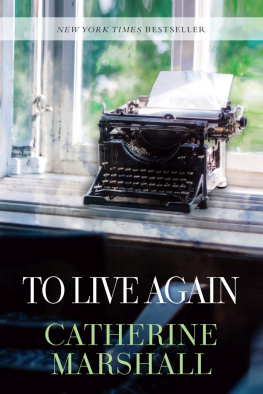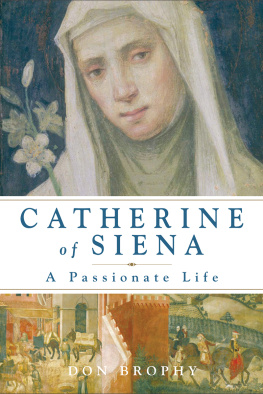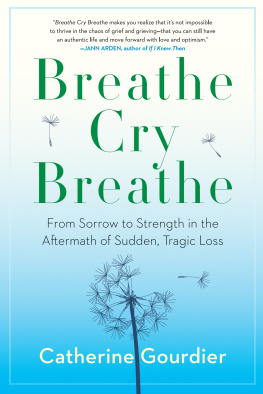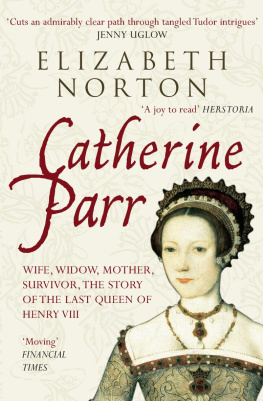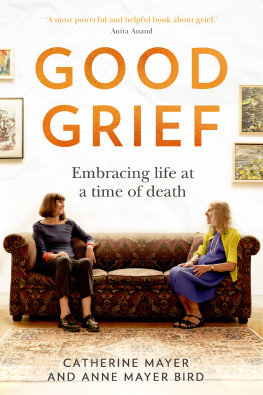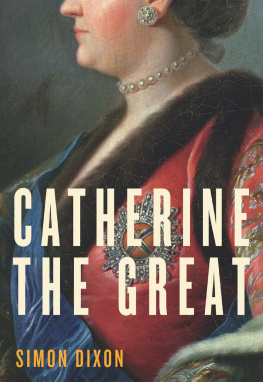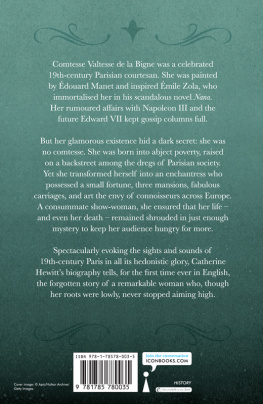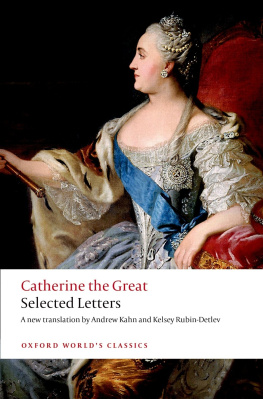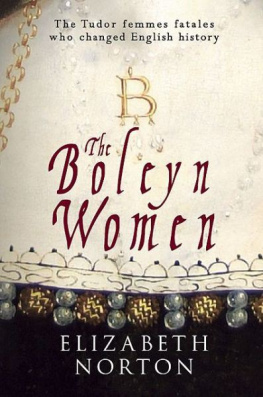Peter Carey
The Chemistry of Tears
DEAD, AND NO ONE told me. I walked past his office and his assistant was bawling.
What is it Felicia?
Oh havent you heard? Mr. Tindalls dead.
What I heard was: Mr. Tindall hurt his head. I thought, for Gods sake, pull yourself together.
Where is he, Felicia? That was a reckless thing to ask. Matthew Tindall and I had been lovers for thirteen years, but he was my secret and I was his. In real life I avoided his assistant.
Now her lipstick was smeared and her mouth folded like an ugly sock. Where is he? she sobbed. What an awful, awful question.
I did not understand. I asked again.
Catherine, he is dead, and thus set herself off into a second fit of bawling.
I marched into his office, as if to prove her wrong. This was not the sort of thing one did. My secret darling was a big dealthe Head Curator of Metals. There was the photo of his two sons on the desk. His silly soft tweed hat was lying on the shelf. I snatched it. I dont know why.
Of course she saw me steal it. I no longer cared. I fled down the Philips stairs into the main floor. On that April afternoon in the Georgian halls of the Swinburne Museum, amongst the thousand daily visitors, the eighty employees, there was not one single soul who had any idea of what had just happened.
Everything looked the same as usual. It was impossible Matthew was not there, waiting to surprise me. He was very distinctive, my lovely. There was a vertical frown mark just to the left of his big high nose. His hair was thick. His mouth was large, soft and always tender. Of course he was married. Of course. Of course. He was forty when I first noticed him, and it was seven years before we became lovers. I was by then just under thirty and still something of a freak, that is, the first female horologist the museum had ever seen.
Thirteen years. My whole life. It was a beautiful world we lived in all that time, sw1, the Swinburne Museum, one of Londons almost-secret treasure houses. It had a considerable horological department, a world-famous collection of clocks and watches, automata and other wind-up engines. If you had been there on 21 April 2010, you may have seen me, the oddly elegant tall woman with the tweed hat scrunched up in her hand. I may have looked mad, but perhaps I was not so different from my colleaguesthe various curators and conservatorspounding through the public galleries on their way to a meeting or a studio or a store room where they would soon interrogate an ancient object, a sword, a quilt, or perhaps an Islamic water clock. We were museum people, scholars, priests, repairers, sand-paperers, scientists, plumbers, mechanicstrain-spotters reallywith narrow specialities in metals and glass and textiles and ceramics. We were of all sorts, we insisted, even while we were secretly confident that the stereotypes held true. A horologist, for instance, could never be a young woman with good legs, but a slightly nerdy man of less than five foot sixcautious, a little strange, with fine blond hair and some difficulty in looking you in the eye. You might see him scurrying like a mouse through the ground-floor galleries, with his ever-present jangling keys, looking as if he was the keeper of the mysteries. In fact no one in the Swinburne knew any more than a part of the labyrinth. We had reduced our territories to rat runsthe routes we knew would always take us where we wanted to go. This made it an extraordinarily easy place to live a secret life, and to enjoy the perverse pleasure that such a life can give.
In death it was a total horror. That is, the same, but brighter, more in focus. Everything was both crisper and further away. How had he died? How could he die?
I rushed back to my studio and Googled Matthew Tindall, but there was no news of any accident. However my inbox had an email which lifted my heart until I realized he had sent it at 4 p.m the day before. I kiss your toes. I marked it unread.
There was no one I dared turn to. I thought, I will work. It was what I had always done in crisis. It is what clocks were good for, their intricacy, their peculiar puzzles. I sat at the bench in the workroom trying to resolve an exceedingly whimsical eighteenth-century French clock. My tools lay on a soft grey chamois. Twenty minutes previously I had liked this French clock but now it seemed vain and preening. I buried my nose inside Matthews hat. Snuffle we would have said. I snuffle you. I snuffle your neck.
I could have gone to Sandra, the line manager. She was always a very kind woman but I could not bear anyone, not even Sandra, handling my private business, putting it out on the table and pushing it around like so many broken necklace beads.
Hello Sandra, what happened to Mr. Tindall, do you know?
My German grandfather and my very English father were clockmakers, nothing too spectacularfirst Clerkenwell, then the city, then Clerkenwell againmostly good solid English five-wheel clocksbut it was an item of faith for me, even as a little girl, that this was a very soothing, satisfying occupation. For years I thought clockmaking must still any turmoil in ones breast. I was so confident of my opinion, so completely wrong.
The tea lady provided her depressive offering. I observed the anticlockwise motion of the slightly curdled milk, just waiting for him, I suppose. So when a hand did touch me, my whole body came unstitched. It felt like Matthew, but Matthew was dead, and in his place was Eric Croft, the Head Curator of Horology. I began to howl and could not stop.
He was the worst possible witness in the world.
Crafty Crofty was, to put it very crudely, the master of all that ticked and tocked. He was a scholar, a historian, a connoisseur. I, in comparison, was a well-educated mechanic. Crofty was famous for his scholarly work on Sing-songs by which is meant those perfect imperial misunderstandings of oriental culture we so successfully exported to China in the eighteenth century, highly elaborate music boxes encased in the most fanciful compositions of exotic beasts and buildings, often placed on elaborate stands. That was what it was like for members of our caste. We built our teetering lives on this sort of thing. The beasts moved their eyes, ears and tails. Pagodas rose and fell. Jewelled stars spun and revolving glass rods provided a very credible impression of water.
I bawled and bawled and now I was the one whose mouth became a sock puppet.
Like a large chairman of a rugger club who has a chihuahua as a pet, Eric did not at all resemble his Sing-songs, which one might expect to be the passion of a slim fastidious homosexual. He had a sort of hetero gung-ho quality metals people are expected to have.
No, no, he cried. Hush.
Hush? He was not rough with me but he got his big hard arm around my shoulder and compelled me into a fume cupboard and then turned on the extractor fan which roared like twenty hairdryers all at once. I thought, I have let the cat out of the bag.
No, he said. Dont.
The cupboard was awfully small, built solely so that one conservator might clean an ancient object with toxic solvent. He was stroking my shoulder as if I were a horse.
We will look after you, he said.
In the midst of bawling, I finally understood that Crofty knew my secret.
Go home for now, he said quietly.
I thought, Ive betrayed us. I thought, Matthew will be pissed off.
Meet me at the greasy spoon, he said. Ten oclock tomorrow? Across the road from the Annexe. Do you think you can manage that? Do you mind?
Yes, I said, thinking, so thats itthey are going to kick me out of the main museum. They are going to lock me in the Annexe. I had spilled the beans.
Good. He beamed and the creases around his mouth gave him a rather catlike appearance. He turned off the extractor fan and suddenly I could smell his aftershave. First well get you sick leave. Well get through this togetherIve got something for you to sort out, he said. A really lovely object. Thats how people talk at the Swinburne. They say object instead of clock.


